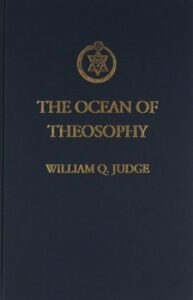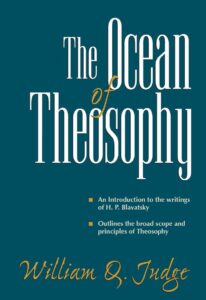Studies In The Ocean of Theosophy Part XIX
Theosophy Magazine
Vol. 22, No. 7, May 1934
pages 315 - 317
Part XIX
KARMA and Reincarnation form the warp and woof of the fabric of existence. As the student’s comprehension of this increases, his wonder grows that contentment should ever be found without these doctrines as the basis for daily living.
Man loves the beauties of Nature, finds uplift in her nobler moods, but shrinks in terror from her destructive powers. Yet, like unto the mighty Mother, he himself displays these same dual aspects. Every period of life has its esthetic and inspirational side: exquisite, innocent infancy, gleeful childhood, youth bubbling with joyous enthusiasm, the strength and grace of early maturity, and ripened stability of elder years, followed by the brooding peace of old age. These are pictures of the ideal personal existence hidden in the hearts of all. In point of fact, however, each terrace of experience is splotched with the undesirable. Side by side with the fair and the lovely in these stages of Man’s earthly career run their opposites, in ugly features. All too commonly are the seasons of human development marred: infants express anger; children, vindictiveness; youth, cold indifference; manhood, harshness and cruelty; old age, querulous selfishness.
The close kinship of Man and Nature is also shown in their mutual suffering from apparently outside sources. In society, fortunate and unfortunate conditions are distributed with a curious incongruity. How frequently the sense of justice is violated by seeing the deprivations of the upright, while the unworthy are beheld to thrive and flourish! Similarly, Nature’s incessant efforts to build and preserve are often foiled by the destruction of her fairest products. So, “as there is plainly, indeed painfully, evident in every human being a constant destruction going on in and around us, a continual war not only among men but everywhere through the whole solar system, causing sorrow in all directions, reason requires a solution of the riddle. The poor, who see no refuse or hope, cry aloud to a God who makes no reply, and then envy springs up in them when they consider the comforts and opportunities of the rich.”
Intelligence calls for serious “questioning of the justice which will permit such misery to those who did nothing requiring them to be born with no means, no opportunities for education, no capacity to overcome social, racial, or circumstantial obstacles.” Unmerited woe, and unrighted wrongs furnish no grounds for “faith”; and neither do unearned blessings, like those of “the rich profligates, the wealthy fools, enjoying themselves unpunished”. Extraordinary honors would not be considered due an earthly father who bestowed benefits upon the worst members of his household and deprived his best children. Nevertheless, priestcraft has deeply impressed the mass mind with just such conception of “the Almighty as a thinking entity, extraneous to the Cosmos” — an irresponsible and incompetent creator, who “builds up, finds his construction inharmonious, out of proportion, errant, and disturbed, and then has to pull it down, destroy, or punish that which he created.” Absurdly enough, it is this conjurement that has influenced millions to repudiate the true Teaching. Men tremble to consider anything conflicting with these trumped up ideas of Deity. No wonder they call themselves “God fearing”!
The conception indicated above amounts to a race “dweller”. Although a mere fiction, fabricated by interests that would enslave the mind, it is none the less a haunt-menace, causing “thousands to live in fear of God, in compliance with his assumed commands, with the selfish object of obtaining reward and securing escape from his wrath, or has plunged them into darkness which comes from a denial of all spiritual life.” In this way, hosts of Manasic beings forfeit their kingly right to think, afraid to exercise, or even to recognize, their own thrice royal powers or to face the real characterization of the “loving Father” they have been taught to regard as author of all. So obviously unloving are many of the acts attributed to God, even if regarded as “tests of faith”, that professed worship bears the ear marks of political bribery or religious immunization against other and worse perpetrations of the “Lord”.
Emancipated from the church’s “unreasonable reference to an inaccessible God whose arbitrary will causes their misery”, men may then seek and find the source of both misery and happiness, the fruitfulness of such search depending upon their courage. Lacking in this prime requisite, the newly found freedom may tend to produce fatalism, so-called. But all the evidence goes to prove that no man is really a fatalist. Whosoever lays down a single cause with an eye to its probable result is not fatalistic. For if Fate rules, any attempt to produce results would be sheer folly. No soldier would enlist for battles already lost or won by fixed decree. No line of endeavor would be undertaken, if the toiler’s efforts could bring about no results. If what is to be, will be, regardless, why bother with anything? Indeed, Fate to be fate would preclude our very existence, or else, use us like pawns on a chess-board.
Meantime, in the realm of hard facts, where we are confronted by stern necessity, there has been established a stolid, hopeless acceptance of the truth that “in every walk of life, loss, injury, persecution, deprivation of opportunity, nature’s own forces working to destroy the happiness of man, death, reverses, disappointment continually beset good and evil men alike.” Theosophy’s first problem and, perhaps, its most serious one is how to arouse questioning. Earnest inquiry would soon make plain that “nowhere is there any answer or relief save in the ancient truth that each man is the maker and fashioner of his own destiny, the only one who sets in motion the causes for his own happiness and misery. In one life he sows and in the next he reaps. Thus on and forever the law of Karma leads him.”
Again, this is not “fate under another name”, as some have accused, “an already fixed and formulated destiny from which no escape is possible, and which therefore might make us careless of act or thought that cannot affect destiny”; but “is a law so comprehensive in its sweep, embracing at once our physical and our moral being, that it is only by paraphrase and copious explanation one can convey its meaning in English. For that reason the Sanscrit term Karma was adopted to designate it.”
“No spot or being in the universe is exempt from the operation of Karma, but all are under its sway; punished for error by it yet beneficently led on, through discipline, rest, and reward, to the distant heights of perfection.” Yet individual choice is inviolable and nothing is inevitable save the establishment of justice and the restoration of disturbed harmony. All that Karma brings is beneficent; even punishment for error involving opportunity to clear away debts and learn more of Life’s meaning. Were there more conception of “distant heights of perfection” to be scaled, the doctrine of Karma would be more readily understood and accepted. Inert, bound down by prejudice, blinded by misconception, weakened by fear and suffering, Humanity feebly gropes its way towards the destined Goal — unconsciously and often falling back to the lower levels, when it might escape from the wilderness and find that Path which, though rugged, leads directly towards the Heights of perfection. It is for these Heights that Mankind sighs, however much the longing is misconstrued. The heart might find its satisfaction. The Race might tread its evolutionary way with wisdom, confidence, and joy. Theosophy shows that way, than which there is no other.
Back to Ocean of Theosophy



